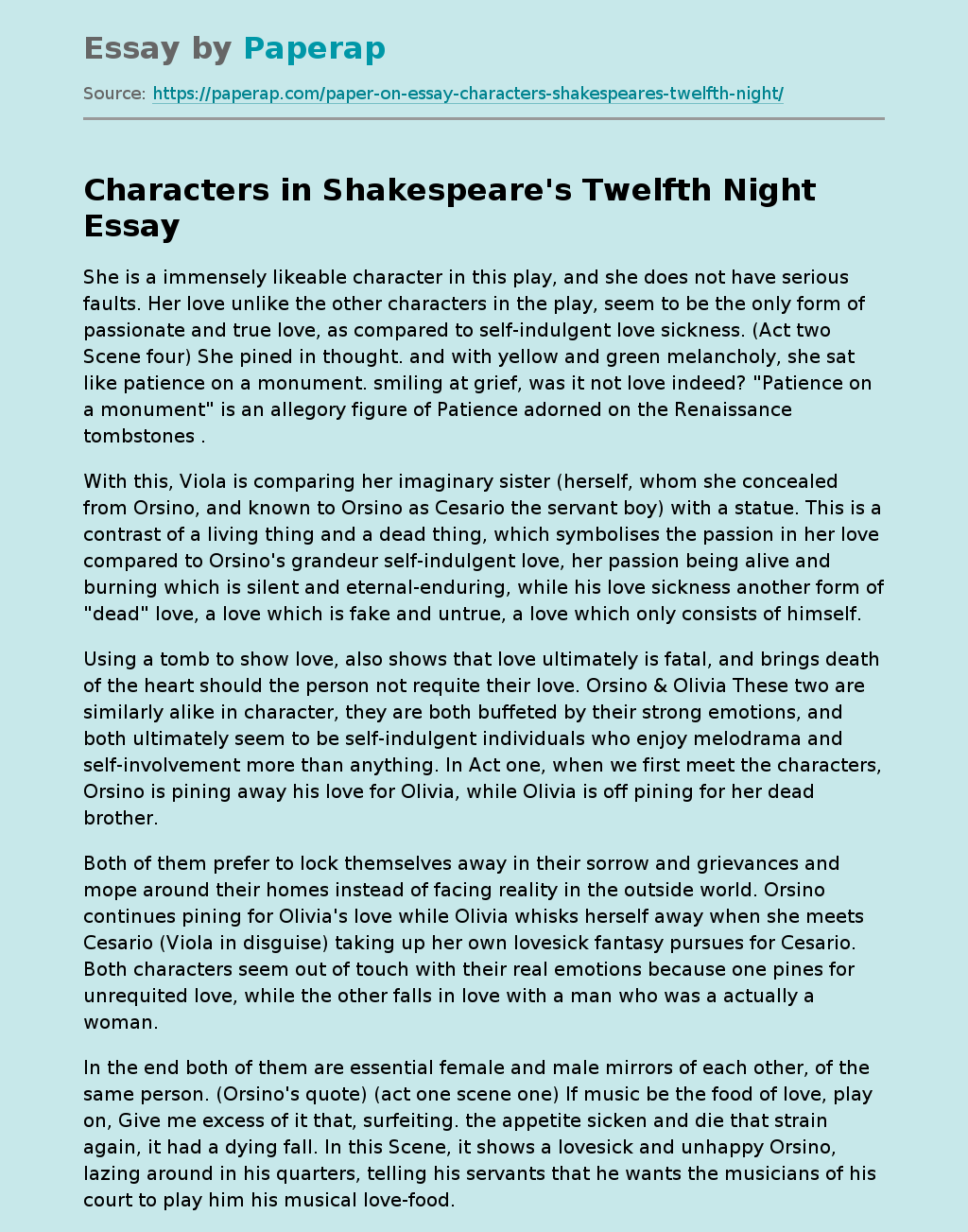Characters in Shakespeare's "Twelfth Night"
Viola is a immensely likeable character in this play, and she does not have serious faults. Her love unlike the other characters in the play, seem to be the only form of passionate and true love, as compared to self-indulgent love sickness. (Act two Scene four) She pined in thought. and with yellow and green melancholy, she sat like patience on a monument. smiling at grief, was it not love indeed? “Patience on a monument” is an allegory figure of Patience adorned on the Renaissance tombstones .
With this, Viola is comparing her imaginary sister (herself, whom she concealed from Orsino, and known to Orsino as Cesario the servant boy) with a statue. This is a contrast of a living thing and a dead thing, which symbolises the passion in her love compared to Orsino’s grandeur self-indulgent love, her passion being alive and burning which is silent and eternal-enduring, while his love sickness another form of “dead” love, a love which is fake and untrue, a love which only consists of himself.
Using a tomb to show love, also shows that love ultimately is fatal, and brings death of the heart should the person not requite their love. Orsino & Olivia These two are similarly alike in character, they are both buffeted by their strong emotions, and both ultimately seem to be self-indulgent individuals who enjoy melodrama and self-involvement more than anything. In Act one, when we first meet the characters, Orsino is pining away his love for Olivia, while Olivia is off pining for her dead brother.
Both of them prefer to lock themselves away in their sorrow and grievances and mope around their homes instead of facing reality in the outside world. Orsino continues pining for Olivia’s love while Olivia whisks herself away when she meets Cesario (Viola in disguise) taking up her own lovesick fantasy pursues for Cesario. Both characters seem out of touch with their real emotions because one pines for unrequited love, while the other falls in love with a man who was a actually a woman.
In the end both of them are essential female and male mirrors of each other, of the same person. (Orsino’s quote) (act one scene one) If music be the food of love, play on, Give me excess of it that, surfeiting. the appetite sicken and die that strain again, it had a dying fall. In this Scene, it shows a lovesick and unhappy Orsino, lazing around in his quarters, telling his servants that he wants the musicians of his court to play him his musical love-food.
So that he will have an overdose of it, and will cease to desire for love anymore. In this quote, Shakespear portrays Orsino as a self-indulgent indiviual, because when you lack love you had two options- starving yourself from it, or to stuff yourself with it. With this logic in mind, Orsino decided to stuff himself with it, which shows his self-indulgence, because he’d rather stuff and lament after that he has no more love, than to starve and lament that he is hungry for love.
Because of his upbringing as a noble, he does not face hardships and therefore contributes to such a hedonistic life-style. Viola’s quote (Act One Scene 5) Make me a willow cabin at your gate, and call upon my soul within the house write loyal cantons of contemned love, and sing them loud even in the dead of night. This speech’s main purpose was Orsino’s message of love through Cesario to Olivia, however, Cesario puts aside his messages of love on what he would do if he were in love with her.
This speech is significant, then, because it set a stage for Olivia’s infatuation with the person she thinks is Cesario: instead of helping the Duke win Olivia’s heart, Cesario’s passionate words make Olivia fall in love with him, this shows the self-indulgent fantasy of Olivia, changing heart so quick. From pining away for her brother, she suddenly had a change of heart, because of Cesario’s words. They were just mere words that managed to swiftly bring the circumstances around, which show that Olivia had little or not much control over her strong emotions, which caused her to be fickle and undecisive, which is another result of elf-indulgent love. Malvolio He seems to be minor character at first, and his humiliation may seem to be only an added amusing support to the Viola- Orsino- Olivia love triangle, but he becomes more interesting along the way.
At first, Malvolio may seem to be the stiff and rigid servant of Olivia, who likes nothing but fun, This causes the enmity of the zany, drunken Sir Toby and the clever Maria. They together plan his downfall. This causes the other side of Malvolio to be revealed. Because Maria had forged Olivia’s handwriting and wrote him a “love letter” is revealed his remarkable ambitions.
Which to a large extend required him to marry Olivia, and as he puts it become “Count Malvolio” However, in the Shakespearean time woman marry a man with higher authority than herself, putting her in a more dignified class. In this case, Malvolio is marrying a woman of higher ranking than himself. This is regard shameful for the men of their time, however, to achieve his ambitions, he put his side his dignity to marry a woman of higher status. In the end, he did not marry Olivia, which shows, when everyone else is happy, someone has to suffer.
Characters in Shakespeare's "Twelfth Night". (2019, Jun 20). Retrieved from https://paperap.com/paper-on-essay-characters-shakespeares-twelfth-night/

